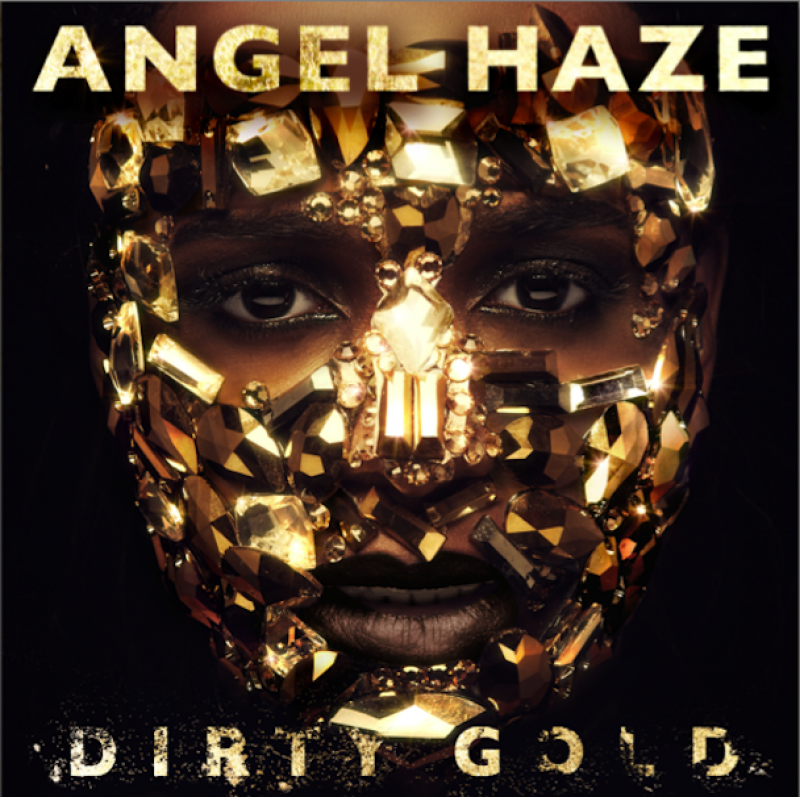CD: Angel Haze - Dirty Gold | reviews, news & interviews
CD: Angel Haze - Dirty Gold
CD: Angel Haze - Dirty Gold
Female MC from New York plays a bold hand on major label debut

Angel Haze learnt the art of crafting an identity from gigantic pop icons. Raised in what she describes as a cult, she was unable to hear pop music until the age of 14, when she discovered - and devoured - everything at once.
Everything comes to a head in the understated closing track
Sonically, there’s a lot about Dirty Gold that is derivative and even garish; the club-ready synth stabs of lead singles “Echelon” and “A Tribe Called Red” make for the record’s least enjoyable moments, and radio ballad “Angels & Airwaves” nods to early-Noughties American pop-punk with its reference to the Blink 182 spin-off and its unflinching lyrics about contemplating suicide set to an uplifting chorus. “Battle Cry”, a song co-written by and featuring pop anthem overlord Sia, is almost too Sia for its own good. At moments like this, Haze’s relatability becomes swamped by over-familiar, cheesy signifiers that almost detract from her sincerity.
 But that sincerity, when it does break through, is blistering. Stinging, incomparable moments include Haze’s impersonation of a preacher and exploration of the meaning of religious belief on “Black Synagogue” - a track that sees the overpowering discourse of her upbringing intertwined with the pop discourse she gorged herself on as soon as she was free - and lines like the bitter “I was busy building castles for a dead man” on the total jam “Deep Sea Diver”. “White Lillies/White Lies” is a stand-out track, and like all other such moments on this album, its brilliance is wrapped up in elements that are also repellent and difficult. Between its drunken, staggering percussion and almost religious chords, Haze explores the prowling low-end of her vocal range as she snarls her way through a story about her stripper friend, with lyrics that make you wince: “Whose daughter’s on that stage?”. Halfway through, the track breaks down into a smouldering slow jam, weaving a story that clings uncomfortably to your skin like static electricity.
But that sincerity, when it does break through, is blistering. Stinging, incomparable moments include Haze’s impersonation of a preacher and exploration of the meaning of religious belief on “Black Synagogue” - a track that sees the overpowering discourse of her upbringing intertwined with the pop discourse she gorged herself on as soon as she was free - and lines like the bitter “I was busy building castles for a dead man” on the total jam “Deep Sea Diver”. “White Lillies/White Lies” is a stand-out track, and like all other such moments on this album, its brilliance is wrapped up in elements that are also repellent and difficult. Between its drunken, staggering percussion and almost religious chords, Haze explores the prowling low-end of her vocal range as she snarls her way through a story about her stripper friend, with lyrics that make you wince: “Whose daughter’s on that stage?”. Halfway through, the track breaks down into a smouldering slow jam, weaving a story that clings uncomfortably to your skin like static electricity.
Everything comes to a head in the understated closing track, “Dirty Gold”, which sees a distorted Haze rapping about her past lack of self-esteem over a swell of piano chords and quivering strings. It’s the most explicit expression of a theme that runs throughout this album, of Haze taking her soapbox moment to address her past self - aka the underdog, the outsider, the victim - and to provide some hope. As the album closes full of peace and optimism, it makes sense to go back and listen to the first track, the brash and joyous “Sing About Me”, where Haze puts behind her the fact that she “never really had friends” for the new realisation that her own life is the subject of pop songs now.
Overleaf: Watch the video for "Echelon (It's My Way)"
rating
Share this article
The future of Arts Journalism
You can stop theartsdesk.com closing!
We urgently need financing to survive. Our fundraising drive has thus far raised £49,000 but we need to reach £100,000 or we will be forced to close. Please contribute here: https://gofund.me/c3f6033d
And if you can forward this information to anyone who might assist, we’d be grateful.

Subscribe to theartsdesk.com
Thank you for continuing to read our work on theartsdesk.com. For unlimited access to every article in its entirety, including our archive of more than 15,000 pieces, we're asking for £5 per month or £40 per year. We feel it's a very good deal, and hope you do too.
To take a subscription now simply click here.
And if you're looking for that extra gift for a friend or family member, why not treat them to a theartsdesk.com gift subscription?
more New music
 Trio da Kali, Milton Court review - Mali masters make the ancient new
Three supreme musicians from Bamako in transcendent mood
Trio da Kali, Milton Court review - Mali masters make the ancient new
Three supreme musicians from Bamako in transcendent mood
 Hollie Cook's 'Shy Girl' isn't heavyweight but has a summery reggae lilt
Tropical-tinted downtempo pop that's likeable if uneventful
Hollie Cook's 'Shy Girl' isn't heavyweight but has a summery reggae lilt
Tropical-tinted downtempo pop that's likeable if uneventful
 Pop Will Eat Itself's 'Delete Everything' is noisy but patchy
Despite unlovely production, the Eighties/Nineties unit retain rowdy ebullience
Pop Will Eat Itself's 'Delete Everything' is noisy but patchy
Despite unlovely production, the Eighties/Nineties unit retain rowdy ebullience
 Music Reissues Weekly: The Earlies - These Were The Earlies
Lancashire and Texas unite to fashion a 2004 landmark of modern psychedelia
Music Reissues Weekly: The Earlies - These Were The Earlies
Lancashire and Texas unite to fashion a 2004 landmark of modern psychedelia
 Odd times and clunking lines in 'The Life of a Showgirl' for Taylor Swift
A record this weird should be more interesting, surely
Odd times and clunking lines in 'The Life of a Showgirl' for Taylor Swift
A record this weird should be more interesting, surely
 Waylon Jennings' 'Songbird' raises this country great from the grave
The first of a trove of posthumous recordings from the 1970s and early 1980s
Waylon Jennings' 'Songbird' raises this country great from the grave
The first of a trove of posthumous recordings from the 1970s and early 1980s
 Lady Gaga, The Mayhem Ball, O2 review - epic, eye-boggling and full of spirit
One of the year's most anticipated tours lives up to the hype
Lady Gaga, The Mayhem Ball, O2 review - epic, eye-boggling and full of spirit
One of the year's most anticipated tours lives up to the hype
 Slovenian avant-folk outfit Širom’s 'In the Wind of Night, Hard-Fallen Incantations Whisper' opens the door to inner space
Unconventional folk-based music which sounds like nothing else
Slovenian avant-folk outfit Širom’s 'In the Wind of Night, Hard-Fallen Incantations Whisper' opens the door to inner space
Unconventional folk-based music which sounds like nothing else
 'The Art of Loving': Olivia Dean's vulnerable and intimate second album
Neo soul Londoner's new release outgrows her debut
'The Art of Loving': Olivia Dean's vulnerable and intimate second album
Neo soul Londoner's new release outgrows her debut
 Music Reissues Weekly: The Peanut Butter Conspiracy - The Most Up Till Now
Definitive box-set celebration of the Sixties California hippie-pop band
Music Reissues Weekly: The Peanut Butter Conspiracy - The Most Up Till Now
Definitive box-set celebration of the Sixties California hippie-pop band
 Doja Cat's 'Vie' starts well but soon tails off
While it contains a few goodies, much of the US star's latest album lacks oomph
Doja Cat's 'Vie' starts well but soon tails off
While it contains a few goodies, much of the US star's latest album lacks oomph

Add comment